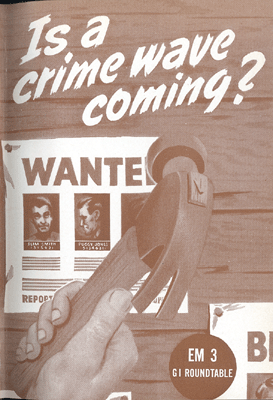By Thorsten Sellin
Editor, Annals, American Academy of Politics and Social Science
(Published January 1946)
 Table of Contents
Table of Contents
What Happened during World War II?
Introduction
Now that the war is over, are the streets of our cities going to be filled any time now with flying tommy-gull bullets? Must our storekeepers live in dread of a visit from a masked young man who will threaten them with a gun while he empties their cash registers? Are we going to have more Valentine’s Day massacres, such as Chicago saw in the prohibition era? Will there be more kidnappings, like those that shocked the nation in the middle 1930’s; more Dillingers, Capones, Dutch Schultzes; more racketeering, graft, and corruption? That is what most of us wonder when we talk about the possibility of a postwar crime wave.
Many people, without having thought much about it, assume that we will have to endure such horrors. They argue that millions of men have been trained in the use of deadly weapons; that they have become calloused to pain and brutality, hardened to personal danger, and inured to killing by their war experiences. They take it for granted that many of these soldiers will find it easier, when they return to civilian life, to go looking for easy money with a gun than to settle down to a humdrum life of hard work.
It’s plausible, but is it true?
What do sociologists and criminologists who have studied the extremely complex problem of crime and criminals say about veterans and crime? They warn us against simple, snap judgments on the matter. After the Napoleonic Wars, for instance, there was a sharp, striking increase in crime in England, which led many people to predict a similar development after the first World War. Actually the predicted crime wave failed to appear.
Before we can discuss the problem intelligently there are a number of basic points that we must settle. We must know what crime is and who are criminals. We must decide how we can tell if crime is rising. We ought to know something about what causes crime in general and sudden changes in the volume of-crime in particular. Then we should have an idea of what war does to law observance. Only with such a background can we begin to make our plans for coping with the postwar problem.
Related Resources

September 7, 2024
Travel and Trade in Later Medieval Africa

September 6, 2024
Sacred Cloth: Silk in Medieval Western Europe

September 5, 2024